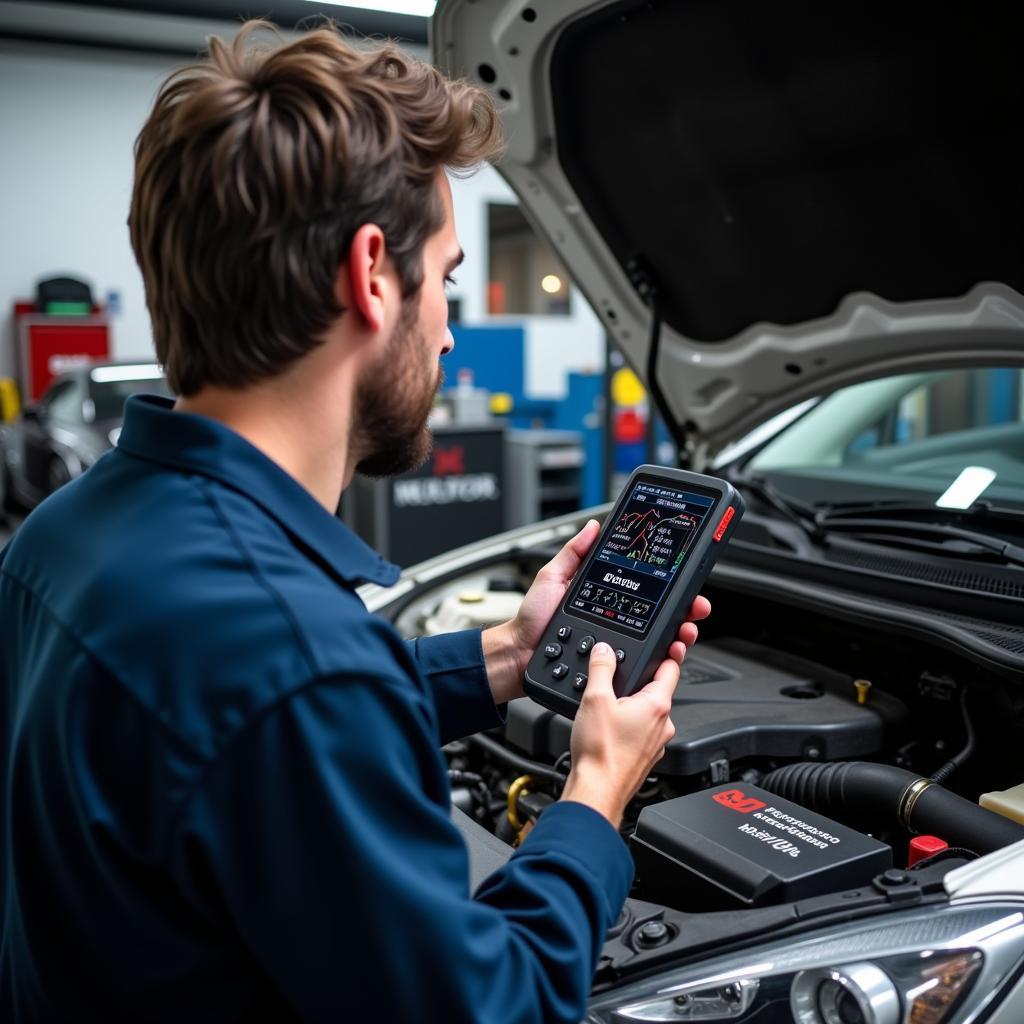Modern vehicles are intricate machines, relying on a complex network of sensors and computers to function optimally. When trouble arises, pinpointing the issue can feel like solving a riddle. This is where car engine diagnostic meters, also known as OBD2 scanners, become indispensable tools for both professionals and car enthusiasts.
Decoding the Language of Your Car: How Car Engine Diagnostic Meters Work
At the heart of your car’s electronic system lies the On-Board Diagnostics II (OBD2) port. This standardized interface allows external devices, like car engine diagnostic meters, to communicate with your vehicle’s computer.
Think of it like this: your car speaks a complex technical language, and the diagnostic meter acts as a translator. By plugging into the OBD2 port, the meter can access and decipher the Diagnostic Trouble Codes (DTCs) stored in your car’s computer. These codes, often presented as a combination of letters and numbers, pinpoint specific areas of concern within the engine and other systems.
Beyond Basic Code Reading: The Power of Advanced Diagnostic Meters
While basic OBD2 scanners can retrieve and clear DTCs, advanced car engine diagnostic meters offer a deeper dive into your car’s inner workings. These sophisticated tools provide a wealth of information, including:
-
Live Data Stream: Monitor real-time data from various sensors, such as engine speed, coolant temperature, and oxygen sensor readings. This allows you to observe how your engine is performing in real-time and identify potential issues before they escalate.
-
Freeze Frame Data: Capture a snapshot of the engine’s parameters at the exact moment a fault code was triggered. This information provides valuable context for diagnosing intermittent problems that might not be apparent during a standard scan.
-
Advanced Diagnostics: Access manufacturer-specific codes and perform bi-directional tests, enabling you to control actuators and components directly for more in-depth troubleshooting.
 Mechanic Using Advanced Car Engine Diagnostic Meter
Mechanic Using Advanced Car Engine Diagnostic Meter
Choosing the Right Car Engine Diagnostic Meter for Your Needs
Selecting the right car engine diagnostic meter depends on your individual needs and expertise. Here’s a quick breakdown:
-
Basic Code Readers: Ideal for DIY enthusiasts looking to read and clear basic DTCs.
-
Mid-Range Scanners: Offer live data streaming and some advanced features, suitable for home mechanics and hobbyists seeking more detailed information.
-
Professional-Grade Diagnostic Tools: Provide comprehensive functionality, including advanced diagnostics and manufacturer-specific capabilities, designed for professional mechanics and automotive technicians.
“Investing in a quality car engine diagnostic meter is akin to having an X-ray vision for your vehicle,” says John Smith, a seasoned automotive engineer. “It empowers you to understand your car’s health, diagnose problems accurately, and potentially save on costly repairs.”
Empowering Car Owners: The Benefits of Using Diagnostic Meters
Car engine diagnostic meters offer numerous benefits for car owners, including:
-
Early Problem Detection: Identify potential issues before they escalate into major repairs, saving you time, money, and potential headaches down the road.
-
Informed Repair Decisions: Understand the root cause of your car’s problems and make informed decisions about repairs, avoiding unnecessary or overpriced services.
-
Enhanced Vehicle Maintenance: Monitor your car’s health regularly and take proactive steps to maintain its performance and longevity.
-
Increased Resale Value: By demonstrating a well-maintained vehicle with a documented service history, you can potentially increase its resale value.
Car Engine Diagnostic Meters: Essential Tools in the Digital Age
As vehicles become increasingly reliant on complex electronics, car engine diagnostic meters have transitioned from specialized tools to essential equipment for anyone involved in automotive care. From identifying a simple sensor malfunction to diagnosing complex engine issues, these devices provide the insights needed to keep your car running smoothly and reliably.
FAQ
Q: Are car engine diagnostic meters compatible with all car models?
A: Most modern vehicles (manufactured after 1996) are equipped with the standardized OBD2 port, making them compatible with a wide range of diagnostic meters. However, certain car manufacturers might have proprietary systems requiring specialized tools.
Q: Can I use a car engine diagnostic meter to reset my car’s check engine light?
A: Yes, most diagnostic meters allow you to clear DTCs and reset the check engine light. However, it’s crucial to address the underlying issue that triggered the light in the first place, as simply clearing the code won’t solve the problem.
Q: Are there any risks associated with using a car engine diagnostic meter?
A: While using a diagnostic meter is generally safe, connecting an incompatible device or attempting to modify settings without proper knowledge could potentially harm your vehicle’s electronics. Always consult your car’s manual and exercise caution when using any diagnostic tool.
Need Help with Car Diagnostics?
Contact DiagFixPro today! We’re here to answer your questions and provide expert advice on all things car diagnostics. Reach us via WhatsApp: +1(641)206-8880 or Email: [email protected]. Our dedicated customer support team is available 24/7 to assist you.